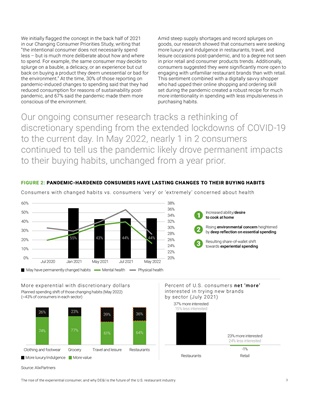
We initially flagged the concept in the back half of 2021
in our Changing Consumer Priorities Study, writing that
"the intentional consumer does not necessarily spend
less - but is much more deliberate about how and where
to spend. For example, the same consumer may decide to
splurge on a bauble, a delicacy, or an experience but cut
back on buying a product they deem unessential or bad for
the environment." At the time, 30% of those reporting on
pandemic-induced changes to spending said that they had
reduced consumption for reasons of sustainability postpandemic,
and 67% said the pandemic made them more
conscious of the environment.
Amid steep supply shortages and record splurges on
goods, our research showed that consumers were seeking
more luxury and indulgence in restaurants, travel, and
leisure occasions post-pandemic, and to a degree not seen
in prior retail and consumer products trends. Additionally,
consumers suggested they were significantly more open to
engaging with unfamiliar restaurant brands than with retail.
This sentiment combined with a digitally savvy shopper
who had upped their online shopping and ordering skill
set during the pandemic created a robust recipe for much
more intentionality in spending with less impulsiveness in
purchasing habits.
3
The rise of the experiential consumer, and why DE&I is the future of the U.S. restaurant industry
Our ongoing consumer research tracks a rethinking of
discretionary spending from the extended lockdowns of COVID-19
to the current day. In May 2022, nearly 1 in 2 consumers
continued to tell us the pandemic likely drove permanent impacts
to their buying habits, unchanged from a year prior.
FIGURE 2: PANDEMIC-HARDENED CONSUMERS HAVE LASTING CHANGES TO THEIR BUYING HABITS
Consumers with changed habits vs. consumers 'very' or 'extremely' concerned about health
Source: AlixPartners
55% 43% 44% 44%
20%
22%
24%
26%
28%
30%
32%
34%
36%
38%
0%
10%
20%
30%
40%
50%
60%
Jul 2020 Jan 2021 May 2021 Jul 2021 May 2022
May have permanently changed habits Physical health
Mental health
Increased ability/desire
to cook at home
Rising environmental concern heightened
by deep reflection on essential spending
Resulting share-of-wallet shift
towards experiential spending
Clothing and footwear Grocery Travel and leisure Restaurants
More experential with discretionary dollars
Planned spending shift of those changing habits (May 2022)
(~43% of consumers in each sector)
More value
More luxury/indulgence
-1%
Restaurants Retail
Percent of U.S. consumers net 'more'
interested in trying new brands
by sector (July 2021)
26% 23%
39% 36%
74% 77%
61% 64%
37% more interested
15% less interested
23% more interested
24% less interested